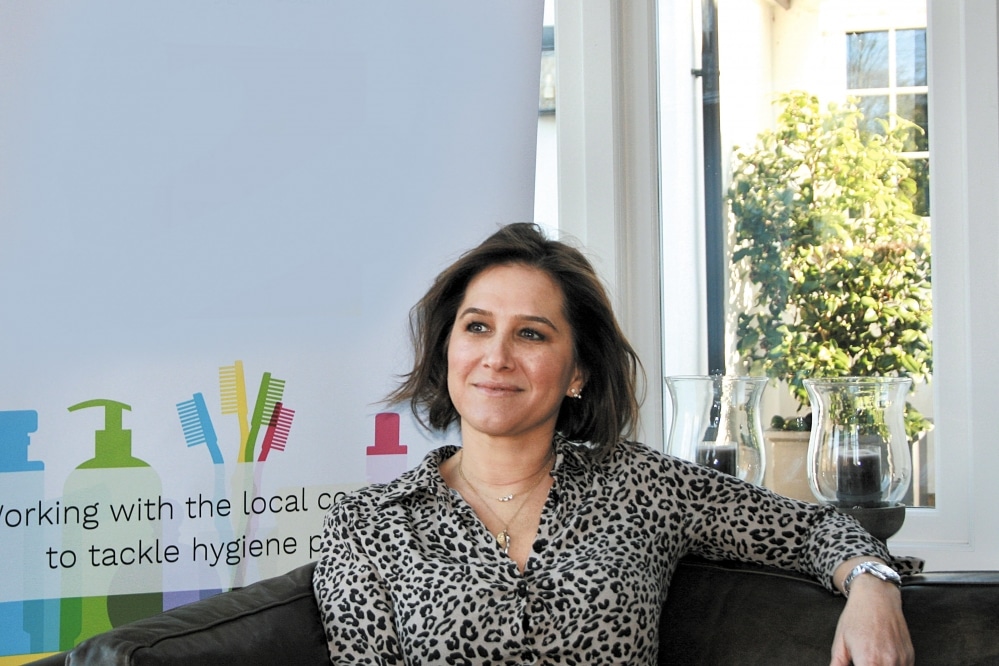Tell us about yourself and how you set up The Hygiene Bank?
It all started after I watched the anti-austerity film I Daniel Blake, directed by Ken Loach. The incredibly moving film relays the brutal reality of often unseen and hidden hygiene poverty within our society.
Why did you think you could help?
Being a widowed mother-of-two, I knew all too well how personal circumstances can dramatically change and having previously taught yoga in prisons I understood the importance of not judging others until you have walked in their shoes. I was galvanised to do something, so in August 2018 I sent a plea to friends on WhatsApp asking for unused and unwanted toiletries that I could take to my local foodbank.
So what happened next?
Well the response was overwhelming and my initiative grew rapidly in a few short weeks. Now, nearly nine months on, The Hygiene Bank has already distributed over 17 tonnes of hygiene products, amounting to a conservative retail value in excess of £210,000. It has become a registered national charity with over 160 locations across the UK and gained a growing community of over 6000 supporters on social media.
What are the most common issues facing those living in hygiene poverty?
Hygiene poverty is a hidden yet very real problem throughout the UK, with over 14 million people affected in some way. 60% of those living in poverty are working families, and astonishingly, 4.5 million of those are children. Hygiene is about wellbeing, self-confidence and dignity. We believe no one should be left struggling to wash their hair, brush their teeth, change their baby’s nappy as often as needed or not afford sanitary protection because of low wages, high housing costs, benefit cuts, illness or bereavement. The Hygiene Bank gives people in crisis access to these basic hygiene and personal care essentials to give them back their dignity.
Tell us briefly about what The Hygiene Bank does to help?
Our model is simple. We collect donated products, sort and repackage them and then distribute these everyday essential items to those that can’t afford them via local authorities, charities and voluntary organisations.
What’s the #ITSINTHEBAG campaign all about?
We launched it as an initiative to make it easy for people to collect and donate. It’s basically a reusable bag that lives in the home (a bit like a recycling bin). You gradually fill it with new and unused hygiene essentials, beauty and personal care products.
Then when the bag is full, you take it and empty it out at your local hygiene bank drop off point. All items donated are given out locally, so it’s all about a community helping its own community. The process of collecting and donating then starts again.
We need the support of pledges to help fund the creation of our #ITSINTHEBAG bags and get one in homes all around the UK.
With this, we will be able to start changing the nation’s behaviour, putting the fight against hygiene poverty at the forefront of our society and help improve the wellbeing of those who are desperately in need.
You can pledge for a bag on our Kickstarter Campaign page here: http://kck.st/2EDxNcR
The Hygeine Bank
The Hygiene Bank’s founder Lizzie Hall will be the guest speaker at the next Wellness HQ Meet Up on Thursday May 30.
Wellness HQ meets ups are relaxed informal get togethers for like-minded people. You can purchase tickets via the website at www.wellnesshq.co.uk
Eight in 10 primary school teachers have seen a rise in the number of children coming to school unwashed or not looking presentable and nearly half of teachers have seen bullying because of hygiene issues.
Three out of 10 teachers regularly buy their pupils toiletry essentials and one in 10 girls in the UK can’t afford sanitary products and so either improvise or miss school.
Most of us don’t think about hygiene items, they live in our bathrooms and we buy and restock as needed.
But for the many living in poverty, they face a stark choice of buying food or hygiene products.
Reports state that 37% have had to go without hygiene or grooming essentials due to lack of funds.








